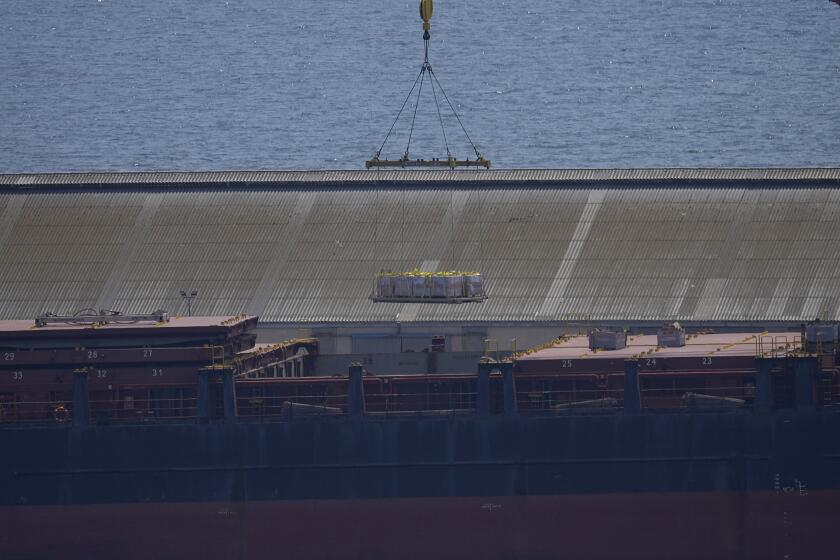SPECIAL REPORT: Oil on the Beach : On Shores of Congress, Spill Expected to Add to Ripple Effect of Outrage
When the hull of the American Trader was ripped open with its own anchor last week and crude oil surged into Southern California’s coastal waters, the ripples could be felt all the way to Washington.
Even before the 400,000-gallon Huntington Beach spill, the oil industry had been fighting a tidal wave of congressional outrage stirred by the 11-million gallon Exxon Valdez disaster in Alaska last March.
Congress had delayed consideration of the industry’s plans for exploratory drilling in the Alaska National Wildlife Reserve and Bristol Bay. It also voted last September to impose a blanket moratorium on new drilling off California until July.
Now, as a congressional conference committee prepares to iron out differences later this month between House and Senate bills that would take the lid off financial liability limits for oil spillers and require expensive double hulls and bottoms for oil tankers, Big Oil is in for yet another bruising battle.
“The impact of the Alaskan spill was enormous. The follow-up spill this week at Newport Beach within helicopter distance of every major media outlet in Los Angeles is going to reinforce the emotion,” Richard W. Lewis, a Washington D.C.-based Chevron, U.S.A. lobbyist said a telephone interview.
Andy Palmer of the American Ocean Campaign, which has been fighting offshore oil drilling, added, “I think this will put the political pressure on even more. It’s clearly the kind of accident that could have been lessened or prevented with a double hull tanker.”
But proponents of tougher liability laws and double hulls still don’t underestimate the oil industry’s determination to push members of the conference committee for favorable provisions.
“I think it will be nip and tuck even with the record floor votes and the spill because it represents a tremendous cost to the oil industry and they’re going to fight it,” Lynda Schuler, an aide to Sen. Pete Wilson, said.
Both the House and Senate bills, approved earlier on overwhelming votes, would create a $1 billion national fund--financed by a new tax on oil--to pay for oil spill damages and would place the U.S. Coast Guard in charge of coordinating cleanup activities.
Both bills would also remove the limit on how much an oil spiller would have to pay in damages if a spill resulted from “gross negligence, willful misconduct or failure to observe navigation or safety laws . . . .”
Barring such failures, however, a tanker’s liability would be limited, depending on its size. The House would sharply raise existing limits of $150 per ton to $1,200 per ton for any accident. The Senate would raise the limit to $1,000 per ton or $10 million, whichever was greater.
The House version of the bill, approved Nov. 1, would require double bottoms, hulls and sides on all new tankers and barges. It also would require existing tankers and barges to be retrofitted with double bottoms within 7 years if they are in excess of 20,000 tons, and double hulls within 15 years.
The Senate bill would require double hulls and bottoms on new tanks only if the secretary of transportation determines within a year of the bill’s passage that the extra construction would result in “a net enhancement of oil tanker navigation safety.” A study that could help settle that issue is due in November by the National Academy of Sciences.
Still, the Huntington Beach spill, in the view of environmentalists, argues persuasively for the tougher House version.
“It’s going to make it a lot harder for industry to say the Senate bill is a better way to go,” said Clifton E. Curtis, executive director of the Oceanic Society in Washington.
Meanwhile, legislation is moving in the California Legislature as well. A bill by Assemblyman Ted Lempert (D-San Mateo) would impose a 50-cent fee on each barrel of oil shipped to the state to underwrite a $500 million oil spill response fund. The money also would be used to strengthen the state Fish and Game Department’s oil spill response office.
Similar to the proposed federal legislation, the Lempert measure--strongly backed by state Controller Gray Davis and Lt. Gov. Leo T. McCarthy--would require tankers in California waters to be double-hulled, would levy a $10-per-gallon fine for any oil spills and a $30-per-gallon fine for spills caused by willful misconduct or negligence.
Several authorities have suggested that had the American Trader been built with a double hull, last Wednesday’s spill may have been much less extensive or averted altogether. Earlier, a Coast Guard study indicated that spillage from the Exxon Valdez would have been reduced by 80% if it had had a double bottom, according to Sen. Brock Adams (D-Wash).
The Huntington Beach spill poses political problems for President Bush as well as the oil industry. The White House is due to announce soon its decision on whether to support a permanent or longer-term moratorium on offshore oil and gas drilling.
“I think that particularly in light of the Huntington Beach spill we should be able to muster the voters to extend the moratorium another year,” said Schuler of Wilson’s office.
“It would be expedient for the President to agree to Congress’ intent. Secondly, it would be a real signal to the country and and the environmental community that Bush does intend to live up to his pledge to be an environmentalist,” she said.
More to Read
Start your day right
Sign up for Essential California for news, features and recommendations from the L.A. Times and beyond in your inbox six days a week.
You may occasionally receive promotional content from the Los Angeles Times.






